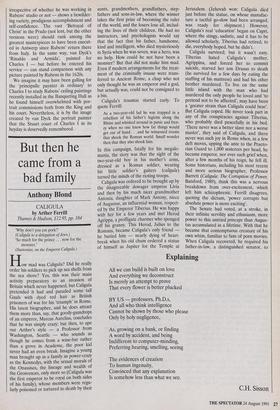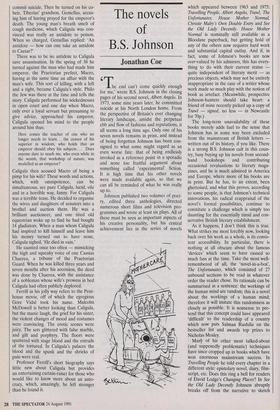But then he came from a bad family
Anthony Blond
CALIGULA by Arther Ferrill
Thames & Hudson, £12.95, pp. 184
`Why don't you eat pork?'
(Caligula to a delegation of Jews.)
`So much for the prince ... now for the monster.'
(Suetonius, on the Emperor Caligula.)
How mad was Caligula? Did he really order his soldiers to pick up sea shells from the sea shore? Yes, this was their main activity preparatory to an invasion of Britain which never happened, but Caligula pretended it had and paraded some tall Gauls with dyed red hair as British prisoners of war for his 'triumph' in Rome. His latest biographer, and he does attract them more than, say, that goody-gumdrops of an emperor, Marcus Aurelius, concludes that he was simply crazy; but then, to ape our Arther's style — a Professor from Washington, Seattle — who sounds as though he comes from a wine-bar rather than a grove in Academe, the poor kid never had an even break. Imagine a young man brought up in a family as power-crazy as the Kennedys, with the sexual morals of the Onassises, the lineage and wealth of the Grosvenors, only more so (Caligula was the first emperor to be royal on both sides of his family), whose members were regu- larly poisoned or tortured to death by their aunts, grandmothers, grandfathers, step- fathers and sons-in-law, where the winner takes the first prize of becoming the ruler of the world, and the losers lose all, includ- ing the lives of their children. He had no instructors, and psychologists would say that the fact that his father, handsome, kind and intelligent, who died mysteriously in Syria when he was seven, was a hero, was no help. How could he not have been a monster? But that did not make him mad. Even if modern arrangements for the treat- ment of the criminally insane were trans- ferred to Ancient Rome, a chap who not only thought he was an emperor and a god, but actually was, could not be consigned to a bin.
Caligula's traumas started early. To quote Ferrill:
As a two-year-old lad he was trapped in a rebellion of his father's legions along the Rhine and whisked around in panic and fren- zy when no one knew how far things would get out of hand. . . and he witnessed events that shook the Roman world. Small wonder then that they also shook him.
In this campaign, fatally for his megalo- mania, the story was that the sight of the two-year-old boy in his mother's arms, dressed as a Roman soldier, wearing his little soldier's gaiters (caligula) turned the minds of the rioting troops.
Caligula was ordered to be brought up by the disagreeable dowager empress Livia and then by his much nicer grandmother Antonia, daughter of Mark Antony, niece of Augustus, an influential woman, respect- ed by the Emperor Tiberius. He was happy with her for a few years and met Herod Agrippa, a profligate charmer who sponged off his granny. This Herod, Julius to the Romans, became Caligula's only friend he buried him — nearly dying of heart- break when his old chum ordered a statue of himself as Jupiter for the Temple at Jerusalem. (Jehovah won: Caligula died just before the statue, on whose manufac- ture a tactful go-slow had been arranged, was ready for shipment.) However, Caligula's real 'education' began on Capri, where the stingy, sadistic, and it has to be allowed scholarly, Tiberius had retired, to die, everybody hoped, but he didn't.
Caligula survived; but it wasn't easy. Tiberius hated Caligula's mother, Agrippina, and forced her to commit suicide, starved her son Drusus to death (he survived for a few days by eating the stuffing of his mattress) and had his other brother murdered. To live on the same little island with the man who had murdered the only people he loved and 'to pretend not to be affected', may have been a 'greater strain than Caligula could bear'. But Caligula coped. He never took part in any of the conspiracies against Tiberius, who probably died peacefully in his bed. `There never was a better slave nor a worse master', they said of Caligula, and there never was such joy in Rome when, in a few deft moves, upping the ante to the Praeto- rian Guard to 1,000 sesterces per head, he became emperor, nor ever such grief when, after a few months of his reign, he fell ill. Some historians, including his most recent and more serious biographer, Professor Barrett (Caligula: The Corruption of Power, Batsford, 1989), think this was a nervous breakdown from over-excitement, which left him schizophrenic. Ferrill disagrees, quoting the dictum, 'power corrupts but absolute power is more exciting'. The Senate had voted, at a stroke, in their infinite servility and ethusiasm, more power to this untried princeps than Augus- tus accumulated in a lifetime. With that he became that contemptuous creature of his own whim, familiar to fans of porn movies. When Caligula recovered, he required his father-in-law, a distinguished senator, to
commit suicide. Then he turned on his co- heir, Tiberius' grandson, Gemellus, accus- ing him of having prayed for the emperor's death. The young man's breath smelt of cough medicine, which Caligula was con- vinced was really an antidote to poison. When so charged, Gemellus replied: 'An antidote — how can one take an antidote to Caesar?'
There was to be no antidote to Caligula save assassination. In the spring of 38 he turned against the man who had made him emperor, the Praetorian prefect, Macro, having at the same time an affair with the man's wife. This sort of killing, with a left and a right, became Caligula's style. Philo the Jew was there at the time and tells the story. Caligula performed his wickednesses in open court and one day when Macro, only ever a loyal servant but presuming to give advice, approached his emperor, Caligula opened his mind to the people around him thus:
Here comes the teacher of one who no longer needs to learn... the censor of his superior in wisdom, who holds that an emperor should obey his subjects ... Does anyone dare to teach me, who even while in the womb, that workshop of nature, was modelled as an emperor?
Caligula then accused Macro of being a pimp for his wife! These words and actions, which, with omnipotence, can be simultaneous, are pure Caligula, lucid, vile and in a horrible way, funny. For Caligula was a terrible tease. He decided to organise the wives and daughters of senators into a brothel and auction them. He was a brilliant auctioneer, and one tired old equestrian woke up to find he had bought 14 gladiators. When a man whom Caligula had inspired to kill himself and leave him his money turned out to have none, Caligula sighed, 'He died in vain.'
He taunted once too often — mimicking the high and squeaky voice of one Cassius Chaerea, a tribune of the Praetorian Guard. When he was killed three years and seven months after his accession, the deed was done by Chaerea, with the assistance of a nobleman whose wife's prowess in bed Caligula had often publicly deplored.
Ferrill in his jolly way refers to the Pent- house movie, off of which the egregious Gore Vidal took his name. Malcolm McDowell is better looking than Caligula, but the manic laugh, the grief for his sister, the violent changes of mood and costumes were convincing. The erotic scenes were juicy. The sets glittered with false marble, and gilt and porphyry. The floors were spattered with stage blood and the entrails of the tortured. In Caligula's palaces the blood and the spunk and the shrieks of pain were real.
Professor Ferrill's short biography says little new about Caligula but provides an entertaining curtain-raiser for those who would like to know more about an auto- cracy, which, amazingly, he left stronger than he found it.



















































 Previous page
Previous page